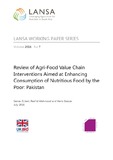| dc.contributor.author | Zuberi, Samar | |
| dc.contributor.author | Mehmood, Rashid | |
| dc.contributor.author | Gazdar, Haris | |
| dc.coverage.spatial | Pakistan | en |
| dc.date.accessioned | 2016-08-16T11:06:12Z | |
| dc.date.available | 2016-08-16T11:06:12Z | |
| dc.date.issued | 2016-07 | |
| dc.identifier.citation | Zuberi, S. et al., (2016) Review of Agri-Food Value Chain Interventions Aimed at Enhancing Consumption of Nutritious Food by the Poor: Pakistan, LANSA Working Paper Series 7. Brighton: LANSA. | en |
| dc.identifier.uri | https://opendocs.ids.ac.uk/opendocs/handle/20.500.12413/12167 | |
| dc.description.abstract | How can agriculture play a more effective role in improving nutrition in countries with a high burden of hidden hunger and where an increasing proportion of the poor sources its food from the market? There is a need to understand how linkages between the farm and the consumer can be made to work for nutrition goals.
This review paper examines the case of Pakistan, which has a relatively productive agricultural sector but which has experienced high and persistent rates of undernutrition. A promising analytical and research perspective in this regard is the concept of value chains, which highlights the multiple ways in which producers and consumers are linked through a variety of processes, interactions and stakeholders. Moreover, value chain-based approaches have been popular development interventions in agricultural and food systems.
This review has compiled 24 agri-food value chain interventions which aim to increase the consumption of nutrient-dense foods or increase their supply to post-farm gate poor populations. This paper provides a descriptive overview of the actors and activities involved in these interventions, and an analysis of the characteristics and challenges of the various agri-food value chain approaches, with the objective of providing insight into the potential of food-based value chain approaches in tackling undernutrition. The review sets out the basis for an empirical analysis which will examine the ability of three of these interventions to address undernutrition. The rationale for the selection of these three case studies and a broad overview of them has also been set out. Further analysis on how the selected agri-food value chain interventions may influence nutritional outcomes will be provided in the forthcoming case studies.
From the interventions included in this review, the following has been noted:
the value chain approach is still largely being utilised as a tool to improve livelihoods in Pakistan, with some examples of interventions connecting this approach to pre-farm gate consumption
agri-food value chain interventions which have a focus on providing nutrient-dense foods to poor consumers could have a greater focus on distribution and utilising those channels through which the poor access food
fortified staples have a strong potential to address undernutrition among target populations, but require the right processes and policy in place
private sector-led interventions need to devise strategies to market and sell their fortified products to consumers in lower income groups
the design of agri-food interventions needs to pay attention to gendered norms of care and market access
These conclusions will refine the analytical lens for the upcoming case study work to help determine what the potential is of the selected agri-food value chain interventions to deliver nutrient-dense foods to low income populations through IYCF. The desk-based review will provide the foundation for the empirical case study work and serve as a guide to the agri-food value chain intervention landscape in Pakistan. | en |
| dc.description.sponsorship | UK Aid | en |
| dc.description.sponsorship | Department for International Development (DFID) | en |
| dc.language.iso | en | en |
| dc.publisher | Leveraging Agriculture for Nutrition in South Asia (LANSA) | en |
| dc.relation.ispartofseries | LANSA Working Paper Series;7 | |
| dc.rights.uri | http://creativecommons.org/licenses/by-nc-nd/4.0/ | en |
| dc.subject | Agriculture | en |
| dc.subject | Development Policy | en |
| dc.subject | Health | en |
| dc.subject | Nutrition | en |
| dc.title | Review of Agri-Food Value Chain Interventions Aimed at Enhancing Consumption of Nutritious Food by the Poor: Pakistan | en |
| dc.type | Series paper (non-IDS) | en |
| dc.rights.holder | ©Leveraging Agriculture for Nutrition in South Asia (LANSA) | en |
| dc.identifier.externaluri | http://www.lansasouthasia.org/ | en |
| dcterms.dateAccepted | 2016-07 | |
| rioxxterms.funder | Department for International Development, UK Government | en |
| rioxxterms.identifier.project | LANSA | en |
| rioxxterms.version | NA | en |
| rioxxterms.funder.project | 752f8189-3789-4438-be29-585edbe66660 | en |


